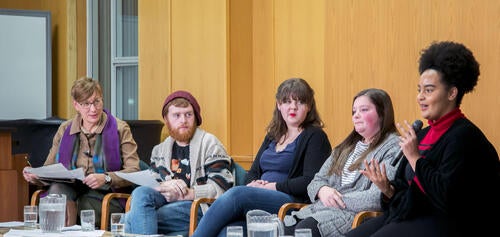Grebel’s 2019 Bechtel Lectures in Anabaptist-Mennonite Studies snuck up on me. Dr. Irma Fast Dueck’s topic “Take me to the Waters: Baptism, Commitment, and the Church” did not initially pique my interest or engage the relevant parts of my psyche until I was already immersed in the subject. It was not until Dueck started sharing her research around the newfound hesitance Christians have towards participating in the ordinance of baptism, that the voice of curiosity within me rose up in unison with the concerns she brought forward.
As an Anabaptist myself, I find my convictions regarding baptism place me in an uncomfortable juxtaposition. With a name like “Anabaptist,” how could baptism not be important to me? But at the same time, what role did baptism actually play in the Christian life? Is baptism akin to merely taking your vitamins, a good thing to do but ultimately unnecessary? If so, what does that say about Christian identity and the church’s role in shaping that Christian identity? Are we ready to accept a Christianity where the rich symbolic traditions of the church have less of a say in how this Christianity is formed in the western church?
The night following her feature lecture, I was fortunate to be chosen to sit on a panel of young adults sharing our insights about young people’s church engagement. The connections between the concerns raised on both nights were felt immediately, as the same types of questions came up. Why are young people seemingly less engaged with the church (and by proxy, its ordinances), and where do young people think church fits in the life of a Christian, if at all?
I was thankful for my fellow panelists’ vulnerability, and I learned that despite popular opinion not all hope is lost. There are still young people who love the church and see great value in it. But I am still worried when our rhetoric about what constitutes salvation or an authentic Christianity continues to be reductionistic, as if the goal is to find the bare minimum required to be a Christian. If we truly profess to love God with everything that we are, as the church, should we not find as many ways as possible to express that love and devotion? Is baptism merely water? Is the church merely a gathering on Sunday mornings? If we really love God, perhaps these symbols and institutions should mean more than what we give them.
As Bechtel Lecturer in Anabaptist-Mennonite Studies, Irma Fast Dueck (BA 1983) was a guest in several classes, offered a public lecture, facilitated a panel of young adults, gave a faculty forum, and reconnected with friends from her days in residence. She is Associate Professor of Practical Theology at Canadian Mennonite University, and her research focuses on themes connected to the practices of the church and the theology conveyed by those practices.

Pictured above are the Bechtel Panelists (l-r): Irma Fast-Dueck, Colin Friesen, Emily Hunsberger, Maria Klassen, and Yeabsra Agonfer







